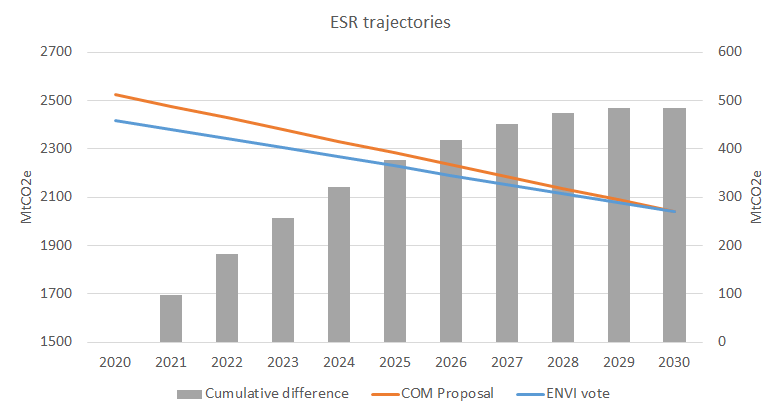For immediate release, Thursday 1st June 2017
Contact (+32) 2893 9208 suzana@sandbag.org.uk for more information
New European Parliament climate policy cuts half a billion tonnes of CO2
- Parliament’s Environment Committee (ENVI) voted on Tuesday to improve the Effort Sharing Regulation. The newly-named “Climate Action Regulation implementing the Paris Agreement” includes a 2050 target of an 80% emission reduction compared to 2005.
- The regulation now better reflects actual emissions levels in non-ETS sectors, limits the use of inappropriate flexibilities for compliance with the 2030 targets, and introduces tighter compliance checks. This will lead to more than 500Mt of additional emissions reductions compared to the Commission proposal.
- Limiting the use of inappropriate flexibilities is positive, but will only have 20Mt total impact. Sandbag proposes that for real carbon savings, the ESR needs an internal flexibility mechanism – the European Project-Based Mechanism.
1st June, London – Sandbag welcomes the outcome of Tuesday’s ENVI Committee vote, which contains an explicit reference to a 2050 roadmap target of -80% compared to 2005, and reduces the size of several loopholes which avoid real emission reductions in the non-ETS sectors until 2030 (1). The Committee’s amendments to adopt a 2018 starting point and limit the use of offsets from forestry will result in emissions reductions of slightly over 500Mt more than the Commission proposal.
At the same time, other parts of the report do not bring Member State 2030 emission reductions onto the 2050 trajectory. The ENVI Committee confirmed different targets for individual Member States in the period to 2030. For those with lower targets they imply very steep emission reduction trajectories after 2030 unless more emission reduction projects are incentivised in these countries.
Instead of promoting stronger development of new projects, the ENVI position still includes unhelpful and unnecessary loopholes which bring hot air into the ESR, such as a 190 Mt flexibility from land use and forestry, 100 Mt flexibility with the ETS, 39 Mt of allowances in Annex IV, and a 70 Mt ‘early action reserve’ which gives additional allowances to Member States that cut ESR emissions before 2020 .

Fig 1: Comparing the effect of Commission and ENVI proposals on the ESR trajectory. The 2018 starting point will have a moderate and diminishing effect on emissions until 2030, and its effect will be further reduced by the existence of loopholes. The amendments introduced to the flexibilities, namely the reduction of the LULUCF flexibility by 90Mt and the introduction of the Early Action Reserve of 70Mt, will only have a net effect of 20Mt.
Suzana Carp, Brussels Office Lead, commented:
“The Parliament’s ENVI report does not reflect countries’ potential for cost effective emissions reductions, and gives Member States access to inappropriate credits for compliance. The introduction of an internal flexibility, known as the European Project-Based Mechanism, would allow Member States to reach their targets together and more cheaply through shared projects that lead to verifiable emission reductions.
Council should endorse this internal flexibility mechanism, and remove the remaining loopholes, to make sure the Regulation gets the non-ETS sectors on the cost-effective path to 2050.” (2)
Notes to Editor
- Yesterday the Parliament’s ENVI Committee proposed that the “Climate Action Regulation implementing the Paris Agreement” should replace the Effort Sharing Regulation. Effort Sharing is a crucial EU climate policy, which covers about 60% of the EU total greenhouse gas emissions, in sectors such as transport, buildings, waste management and agriculture. The 2030 reduction target is made up of individual targets for each Member State. These are based on historic emissions weighted by GDP/capita, with Member States with lower GDP having less stringent targets. Targets are expressed in tonnes in the form of Annual Emissions Allocations (AEAs).
- The function of a European Project-Based Mechanism (EPM) is to enable emissions reductions to be made in the most cost-effective places. A Member State with higher reduction targets and higher decarbonisation costs, can fund emission reduction projects in another Member State as part of meeting its own reduction targets. Currently the ESR – unlike the EU ETS – is not a market-based instrument and therefore prevents price discovery.
Read more in What is the European Project-Based Mechanism (Sandbag, 2017) and Bend it, don’t break it (Sandbag, 2016)
Sandbag is a London and Brussels-based not-for-profit think tank conducting research and campaigning for cost-effective climate policies. Our current focus is on accelerating the European coal phaseout, and reform of the EU Emissions Trading System and EU Effort Sharing Regulation. For more information, visit our website at sandbag.org.uk
